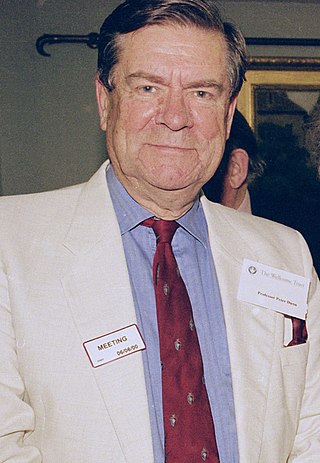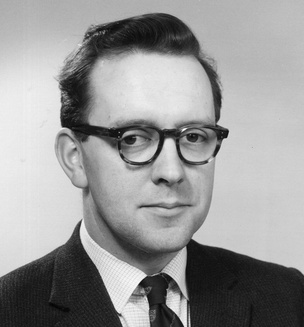Related Research Articles
The Cognition and Brain Sciences Unit is a branch of the UK Medical Research Council, based in Cambridge, England. The CBSU is a centre for cognitive neuroscience, with a mission to improve human health by understanding and enhancing cognition and behaviour in health, disease and disorder. It is one of the largest and most long-lasting contributors to the development of psychological theory and practice.
Malcolm Andrew Ferguson-Smith, is a British geneticist.
Professor Andrew P. Read is a British medical geneticist.
Martin Bobrow is a British geneticist, and Emeritus Fellow, Wolfson College, Cambridge.
Sir John Stuart Lilleyman is a British paediatric haematologist. He specialization is the childhood leukemia.
Anthony Seaton qualified in medicine from Cambridge University in 1962, and after training in Liverpool was appointed assistant professor of medicine at the University of West Virginia, USA in 1969. He became consulting chest physician at the University of Wales in 1971, and was named director of the Institute of Occupational Medicine at Edinburgh in 1978. Seaton became the head of the Department of Environmental and Occupational Medicine at the University of Aberdeen in 1988 and on retiring in 2003 became emeritus professor. He continues to write and teach and has active research interests in the causes of asthma and occupational illness.
The MRC Blood Group Unit, originally the Blood Group Research Unit, was a research unit of the British Medical Research Council from 1946 to 1995. Initially established in the Lister Institute, it transferred to the Galton Laboratory of University College, London in 1975, the original home of its predecessor.
The History of Modern Biomedicine Research Group (HoMBRG) is an academic organisation specialising in recording and publishing the oral history of twentieth and twenty-first century biomedicine. It was established in 1990 as the Wellcome Trust's History of Twentieth Century Medicine Group, and reconstituted in October 2010 as part of the School of History at Queen Mary University of London.
Dr Charles R. Rizza FRCPEd was a British consultant physician, specialising in haematology.
Sir Ian Alexander McGregor, was a Scottish malariologist.

Peter MacNaughton Dunn, FRCP, FRCOG, FRCPCH was an English paediatrician. Dunn was most notable for introducing into the UK the Gregory box in 1971, that provides Continuous positive airway pressure in the treatment of infant respiratory distress syndrome of the newborn and conducting research into Hip dysplasia and fetal adaptation to extrauterine life. Dunn was also notable for being known for founding the charity association British Association of Perinatal Medicine.
Thomas Wilson Meade was a British epidemiologist. He was a pioneer in epidemiology—in particular, in the role blood clotting factors have in cardiovascular disease.
Owen Lyndon Wade (1921-2008) was a British medical researcher and academic, described by the Royal College of Physicians as "one of the founding fathers of clinical pharmacology and therapeutics in the UK".
Roger Hugh Jones is a British general practitioner, a professor of general practice, and former editor of the British Journal of General Practice.
David Abraham Goitein Galton (1922-2006) was a British physician, specialising in haematology.

Patrick Loudon Mollison,, was a British haematologist, described as 'the father of transfusion medicine'.
Jeffrey Kenneth Aronson is a British clinical pharmacologist.
Ann Prentice is a British nutritionist.

Alan Eglin Heathcote Emery is a British medical geneticist, known for his study of muscular dystrophy.

Thomas Graham Brown was a Scottish engineer who was most notable for collaborating in the design of the first medical ultrasound machine along with the obstetrician and designer Ian Donald, a physician at the University of Glasgow and industrial designer and obstetrician John MacVicar.
References
- ↑ "Fellows and Senior Members". Hughes Hall, Cambridge. Archived from the original on 14 April 2012.
- ↑ Who's who of British Scientists. Longman. 1971. p. 430. ISBN 9780582114647 . Retrieved 24 January 2023.
- 1 2 Doris Zallen; Daphne Christie; Tilli Tansey, eds. (2004). The Rhesus Factor and Disease Prevention. Wellcome Witnesses to Contemporary Medicine. History of Modern Biomedicine Research Group. ISBN 978-0-85484-099-1. OL 11612221M. Wikidata Q29581687.
- ↑ Jones, Nevin C. Hughes (22 October 2007). "Security through Co-operation". Medicine and War. 6 (3): 191–194. doi:10.1080/07488009008408930. PMID 2233515.